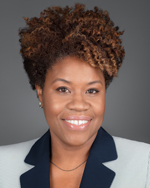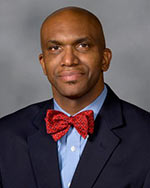Embracing and Celebrating Our Differences
Moffitt Cancer Center has embraced and promoted diversity since its early days, and in 2006 the cancer center recruited Dr. B. Lee Green to strengthen and expand the efforts to address diversity, inclusion and equity.
“For me, diversity is all about creating an environment that looks like the community we serve, where people within the organization feel they are respected and appreciated in an environment where we not only embrace our differences but also celebrate them,” said Green, vice president, Diversity, Public Relations and Strategic Communications.
In July 2006, Green joined the cancer center as senior member of Moffitt’s Health Outcomes and Behavior Program and to lead the newly formed Moffitt Diversity department. By November of that year, Green hired Cathy Grant as the department’s director. They began setting goals, establishing partnerships within the center and throughout the community and addressing challenges some might have considered insurmountable.

Internal challenges included strengthening a centerwide culture of equity, respect and belonging that supports team member inclusion and culturally competent care for patients. Within the community, a big issue was establishing access to care, overcoming system barriers and working directly with the clinical team to embed cultural competence into patient care.
Seeing Moffitt as a Welcoming Place
“A big thing for us was the relationship with our diverse communities,” said Grant. “They didn’t see Moffitt as a place where they could go. They didn’t see themselves represented within the organization. There needed to be attention to our relationship with those communities to help them understand that you are welcome here, and that this is a place where you and your family can come and receive world-class cancer care.”
Green recalls one of his first meetings in the community “like it was yesterday.” He had met with a prostate cancer support group of African American men. “After giving my talk, I expressed how I was looking forward to working with them and asked if there were any questions, thoughts or comments. I was not expecting what I heard,” said Green. “They thanked me for being there but then said they would not be going to Moffitt Cancer Center as they did not see it as a place they could go, that it was not for them. Of course, I was blown away.”

During the months and years following their arrival, Green and Grant worked to position Moffitt as a resource among underserved communities, as an organization delivering culturally and linguistically competent care through prevention education and mutually beneficial partnerships. The achievements included:
- Refocusing the community outreach and education efforts. A part of that plan was to rename the department to the Moffitt Program for Outreach, Wellness, Education and Resources, or M-POWER. The overall mission of M-POWER is to help reduce cancer health disparities by empowering community members to take an active role in preventing disease and maintaining overall health. M-POWER developed healthy lifestyles and cancer-specific educational workshops in English and Spanish. The program also connected community members in need to screening voucher programs for breast, colorectal, lung and prostate cancers. Recently, M-POWER has become part of the Community Outreach, Engagement and Equity team under the direction of Susan Vadaparampil, PhD. This office was created in 2018 to enhance Moffitt’s efforts in addressing community needs from a research perspective.
- Establishing Moffitt’s Community Benefit initiative, which ensures that the cancer center’s community impact directly responds to the needs of patients, families and clinicians through advancing cancer prevention, early detection, clinical care and research, especially for those at-risk populations disproportionately impacted by cancer.
- Partnering for men’s health by leading the efforts for many years with community partners to hold an annual Men’s Health Forum, which served a growing number of men in the Tampa Bay area community without access to regular health care services.
- Growing Moffitt’s Language Services Department as a bridge to ensure equity in care through helping individuals with limited English proficiency and deaf and/or hard-of-hearing patients.
“The beautiful thing is that through our work over the past years, when we go into the community now, the tone has completely changed. African Americans, Hispanics and individuals from other minority communities are increasingly seeing the cancer center as a resource for them and a place where they are welcome,” said Green. “Is it perfect? I would say not, but I am very proud of the work that the team, particularly the outreach team, has done to help dispel the myth that this is not a place that is welcoming.”
Grant said among the many diversity-related initiatives she has helped establish over the years, one of the initiatives she feels made the most positive difference has been work Moffitt has done with the LGBTQ community. “The work with this community is something we did ahead of many other health care organizations, such as the collection of data regarding sexual orientation and gender identity. We were doing that before many other hospitals were doing it,” said Grant. “This is something our Moffitt team members brought to the table, and it led to research efforts around this community. We have been able to improve our policies and improve our processes to support this community, and I think we have made great strides that have put us ahead of the curve when you look at some other health care institutions. So, I’m really proud of that work.”
Grant noted that in 2020 Moffitt was named a Healthcare Equality Index (HEI) Leader in LGBTQ Healthcare Equality for the ninth consecutive year in the Human Rights Campaign Foundation’s HEI report.
In addition to the outreach work aimed at minorities in the Tampa Bay area, Moffitt Diversity began establishing voluntary, employee-led groups called Team Member Engagement Networks, and working with leadership in establishing a Faculty Diversity Oncology Program aimed at recruiting, mentoring and retaining minority faculty members.
“I’m so encouraged by the future of our team member networks because I think they are going to explode over the next few years,” said Green.
In another accolade, Moffitt ranked No. 5 on DiversityInc’s 2020 Top Hospitals & Health Systems list. This is the fifth year in a row Moffitt has placed among the nation’s top companies for capital representation, workplace practices, supplier diversity and leadership accountability. Rankings from 2016 to 2020 have been No. 6, 4, 4, 3 and 5, respectively.
Green attributes much of the national recognitions that Moffitt has received because of Cathy Grant’s leadership. “She is one of the most talented leaders in in the field of diversity and inclusion from across the country, and we are fortunate to have her at Moffitt,” said Green. “And we are also fortunate to have incredible leadership support that started with David de la Parte. His guidance has been instrumental in our overall success.
A Positive Local Economic Impact
Another area requiring attention upon arrival and having a positive impact over the years is supplier diversity. Moffitt recognizes the importance of supplier diversity in all aspects of procurement and business practices and is committed to the inclusion, development, growth and utilization of diverse suppliers. Yet during the early days, evidence of such commitment was virtually nonexistent.
“When we first started that program, we were not doing well in terms of doing business with minority or woman-owned companies. Our numbers were so low, very close to 0%, and I remember how embarrassing it was to report them at a community meeting,” Green recalls.
They put a plan into place, and Green describes the progress as phenomenal. “We had so many key leaders and team members who worked hard to make significant progress in this area,” said Green. “Jack Kolosky has been instrumental in working with us and the community on this issue.”
In fiscal year 2020, the percentage of Moffitt’s overall expenditures spent with diverse suppliers was 14.8%, and during the past five years the increase in diversity spending was 49.86%. This growth represents a positive local economic impact in the communities the cancer center serves.
Despite progress in cancer treatment, screening, diagnosis and prevention over the past few decades, the Black/African American community continues to face higher cancer rates and cancer deaths. In 2017, Moffitt created the George Edgecomb Society, comprising a passionate group of community leaders, which raises funds for Moffitt research into cancer health disparities within the Black/African American community. Since then, the George Edgecomb Society has awarded six grants totaling $400,000 to support research and clinical treatment efforts of scientists focused on cancer health disparities.
Response Plan Seeks to Make a Lasting Commitment
Clearly, Moffitt Diversity, working in concert with the cancer center and community partners, has made much progress in eliminating or reducing inequities and barriers to health equity. In order to continue making progress, however, it is essential to renew and strengthen those efforts, particularly in view of the global community’s demand for accelerated efforts to end long-standing racial inequities. To that end, Green and Grant created a cancer center Response Plan for Diversity, Inclusion and Equity.
Green is confident that the long-term response plan designed to close gaps in the Black/African American and other marginalized communities will be initiated and successfully implemented. “Leadership support at Moffitt is absolutely incredible,” said Green. “The way they have responded to this current situation has been outstanding.”
The response plan aims to make a lasting commitment in addressing racial equality and identifies nine priority areas to receive intentional focus: climate, dialogue, recruitment and retention, education, health disparities, community, data collection, faculty inclusion, and resources.


